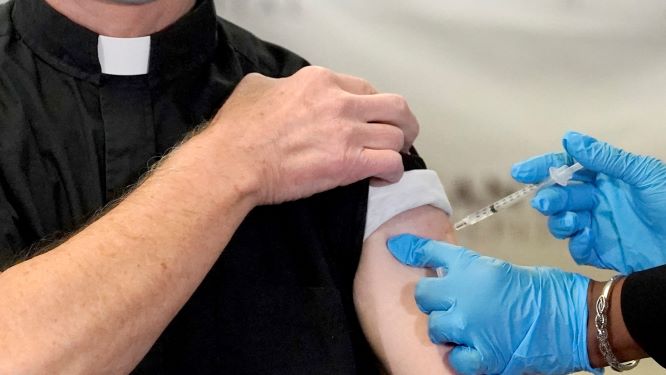In a growing consensus, religious leaders at the forefront of the anti-abortion movement in the United States are telling their followers that the leading vaccines available to combat COVID-19 are acceptable to take, given their remote and indirect connection to lines of cells derived from aborted fetuses.
Al Mohler, president of the Southern Baptist Theological Seminary, said in a Dec. 14 blog post that he would take the vaccine, calling the vaccine’s development program, known as Operation Warp Speed, “this generation’s Apollo program.”
“I will take it not only for what I hope will be the good of my own health, but for others as well,” Mohler said in the blog post.
Another outspoken abortion foe, Robert Jeffress, pastor of First Baptist Church, Dallas, Texas, also expressed support for COVID-19 vaccines, calling them “a present from God.”
“To ask God for help but then refuse the vaccine makes no more sense than calling 911 when your house is on fire, but refusing to allow the firemen in,” Jeffress told the Associated Press via email. “There is no legitimate faith-based reason for refusing to take the vaccine.”
Evangelical response
Among Protestant evangelical leaders, who generally have strong anti-abortion views, there’s been relatively little anti-vaccine rhetoric, according to Russell Moore, who heads the Ethics & Religious Liberty Commission, the public policy arm of the Southern Baptist Convention.
“I wouldn’t be able to think of one evangelical pastor who’s saying, ‘Don’t be vaccinated,’” he said.
A more notable challenge for pastors, Moore said, is countering baseless anti-vaccine conspiracy theories embraced by some members of their congregations or communities — for example that the vaccines would alter a recipient’s DNA or covertly implant a microchip.
Other responses
On a global level, the Vatican has issued guidelines declaring it morally acceptable for Catholics to receive COVID-19 vaccines. The U.S. Conference of Catholic Bishops, which says fighting abortion is its “preeminent” priority, said last month that getting vaccinated against the coronavirus “ought to be understood as an act of charity toward the other members of our community,” according to a statement by the chairmen of its Committee on Doctrine and Committee on Pro-Life Activities.
The bishops said it is morally acceptable for Catholics to use either of the two vaccines approved for use in the U.S. — made by Pfizer and Moderna — despite a “remote connection to morally compromised cell lines.” This entailed the use of fetal cell lines for lab tests seeking to confirm the vaccines’ effectiveness.
Another leading vaccine, made by AstraZeneca and approved for use in Britain and some other countries, is “more morally compromised,” and should be avoided if there are alternatives available, the bishops said.
In Indonesia, home to the world’s largest Muslim population, a Muslim clerical council has been included in that nation’s vaccine procurement process to ensure that a product is halal, or acceptable for use under Islamic law. In the past, the council has ruled that some vaccines for other diseases were unacceptable because they used pork-derived gelatin.
But on Friday the council gave its approval to China’s Sinovac COVID-19 vaccine, paving the way for its distribution in Indonesia.
Click here to read more about COVID-19 vaccine distribution efforts in Alabama.






Share with others: